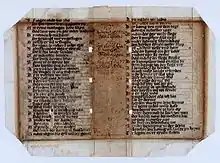Wigand of Marburg
Wigand of Marburg (German: Wigand von Marburg)[2] was a German herald of the Teutonic Knights in Prussia and one of the notable chroniclers of the Middle Ages.

Wigand expanded upon the earlier work of Nikolaus von Jeroschin. His rhyming chronicle is one of the principal sources of information used for the history of the Prussian lands and parts of the adjoining Grand Duchy of Lithuania, covering the period between 1293 and 1394.[3] Originally written in Middle High German rhymed prose, the work combined actual accounts with legends, folk tales, and myths. Out of an estimated length of 17,000 lines, only about 500 have survived to the present day.[3] However, in 1464, the Polish chronicler Jan Długosz, speaking little German, asked Thorn clergyman Konrad Gesselen to translate Wigand's chronicle into Latin, and Gesselen's translation has survived almost intact.[3][4] Gesselen titled his translation New Prussian Chronicle (Latin: Chronica nova Prutenica) to distinguish it from Jeroschin's earlier work, some of which he also translated. Gesselen did not take credit for his translation, but was identified as the author in 1895 by German historian Max Perlbach.[5]
Wigand's chronicle is sometimes referred to in German sources as "Wigand of Marburg's rhyming chronicle" (German: Reimchronik Wigands von Marburg), since it is a medieval chronicle written in rhyming prose in a vernacular language (the definition of a rhyming chronicle). The chronicle is referred to in a few German sources as "[the] 'chronicle of Thorn'/'Thorn chronicle' from 1293 to 1394",[6][7][8] probably because Gesselen's Latin translation was found in Thorn in 1821.[9]
Notes and references
- Hirsch, Theodor (1870). Scriptores rerum Prussicarum 4 (in German). Frankfurt am Main: Minerva. pp. 6–8. OCLC 163052286.
- Note that von Marburg is a purely descriptive title added to his original name of Wigand by later historians, rather than a proper surname. Also the von should not be confused with a preposition used in later times to denote someone's noble status
- Endre Bojtar (2000). Foreword to the Past: A Cultural History of the Baltic People. Budapest: Central European University Press. p. 184. ISBN 963-9116-42-4.
- "Book Notices" (PDF). Quaestiones Medii Aevi Novae. Warszawa: Wydawnictwo DiG. 1: 165. 1996. ISSN 1427-4418. Retrieved 2023-09-02.
The author refers to the state of research on the chronicle by Wigand of Marburg and deals with the growth of secular chivalric ideals among the brethren of the Order of the Teutonic Knights in the fourteenth century, examining their reflection in the analysed monument. The publication in question presents the Toruń clergyman Konrad Gesselen who after 15 June 1464 translated the chronicle into Latin at the request of the Polish historian Jan Długosz
- Perlbach, M. [in German] (1895). "Der Uebersetzer des Wigand von Marburg" [The Translator of Wigand of Marburg]. Altpreussische Monatsschrift (in German). 32: 411–424. Retrieved 2023-09-02.
- Döring, Gottfried (1861). Choralkunde in drei Buchern: Beigabe: Sieben slawische Melodieen aus dem 16. und 17. Jahrhundert. Harmonisiert und mit deutschen Texten versehen von G. Döring (in German). Th. Bertling. p. 14. Retrieved 2020-11-08.
der thorner Chronik von 1293 bis 1394
- Döring, Gottfried (1852). Zur Geschichte der Musik in Preußen: ein historisch-kritischer Versuch (in German). F. W. Neumann-Hartmann. p. 193. Retrieved 2020-11-08.
Thorner Chronik von 1293 bis 1394
- Reissmann, August (1864). Allgemeine Geschichte der Musik: Bd. Der Volksgeist bestimmt die Weiterentwickelung der Tonkunst. Allgemeine Geschichte der Musik (in German). F. Bruckmann. p. 45. Retrieved 2020-11-08.
Die Thorner Chronik (1293-1394)
- Lohmeyer, Karl [in German] (1884). "Marburg, Wigand von". Allgemeine Deutsche Biographie (in German). Vol. 20. pp. 293–294. Retrieved 2020-11-08.
Dieses lateinische Werk, welches 1821 zu Thorn aufgefunden worden war
External links
- Nine fragments of Wigand's chronicle, and Chronica nova Prutenica (Gesselen's Latin translation) with commentary, published by Theodor Hirsch, et al. in Scriptores rerum Prussicarum, volume 2 (1863) (monochrome scan on Google Books)
- Two additional fragments of Wigand's chronicle, published by Theodor Hirsch, et al. in Scriptores rerum Prussicarum, volume 4 (1870) (monochrome scan on Google Books)
- Information about the edition of Chronica nova Prutenica in Scriptores rerum Prussicarum, volume 2